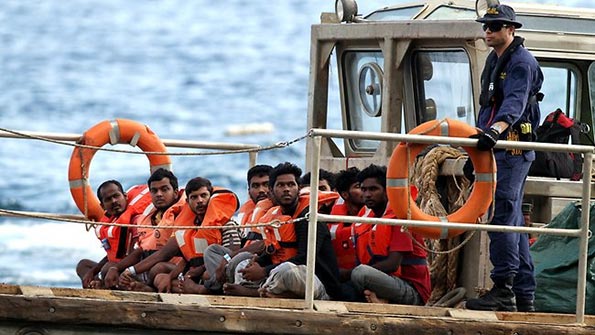Sri Lankan murder suspect eligible for protection visa in Australia

A Sri Lankan man who came to Australia by boat has been found to be eligible for a protection visa, although he is suspected of murder in his home country.
The man, 36, who fled Sri Lanka while on bail, lied in his protection visa application, saying he was not aware of any investigation that could lead to him being charged.
Sri Lanka’s Criminal Investigation Department wrote to the Australian Federal Police in April 2013, saying he was a murder suspect and a warrant had been issued, a tribunal heard.
The man, a Sri Lankan Tamil, initially claimed he had fled Sri Lanka after being in hiding for a year, after being tortured and beaten by members of the Criminal Investigation Department.
But he gave another account after he became aware Australian authorities knew of criminal proceedings against him in Sri Lanka, the Administrative Appeals Tribunal heard.
The man had been arrested, accused of the murder of a pregnant woman who disappeared in 2009, held in custody for weeks and then released.
The man, who denied committing the murder, said he was being implicated in the murder because of his past complaints about the alleged illegal takeover of his land.
He said he was tortured by the CID for four days before he was forced to sign a confession in Sinhalese, which he could not understand.
He said he then spent 18 months in jail before being granted bail and had reported daily for almost two years before leaving Sri Lanka illegally by boat in May, 2012.
After his arrival in Australia he was held in detention and during two interviews he did not tell Immigration officials he had been held in custody and tortured in Sri Lanka.
He feared if he was sent back he would be tortured, given an unfair trial and executed.
Immigration refused his protection visa application in 2013, finding serious reasons for considering he had committed “a serious non-political crime’’ before coming to Australia.
But Tribunal Deputy President James Constance said he was not satisfied that the man had actually been charged with murder and he accepted his claims about his treatment in Sri Lanka.
He said the man’s lies did not prove he had committed the murder and there had been no evidence of murder since the woman disappeared.
“In my view, the evidence falls far short of establishing ‘serious reasons’ for considering that the applicant committed murder,’’ Mr Constance said.
He set aside the refusal of the protection visa and sent his application back to the Minister, Courier Mail reports.
Latest Headlines in Sri Lanka
- Arjun Aloysius and two others released from prison February 22, 2025
- Two more arrested over ‘Ganemulla Sanjeewa’ assassination February 22, 2025
- Sri Lanka Police identify 58 organized crime gangs and 1,400 associates February 22, 2025
- Sri Lankan President pushes for rapid digital economy growth February 22, 2025
- Namal Rajapaksa ready to lead if government dissolves February 22, 2025



This is a significant turn in Australia’s policy for the so-called ethnic issues in Sri Lanka. Prime Minister Anthony Abbot and Foreign Minister Julia Bishop worked closely with the war-winning, popular and indisputably brave leadership of the Rajapaksa yugaya to discourage and prevent Tamil economic boat migrants under the pretext of persecution and discrimination.
Anthony Abbot’s no-boats policy received the support of more than 95% of the Australian Peoples. Anthony Abbot, in the year and half period of office, implemented this policy to the satisfaction of the Australian Peoples.
With the advent of the Yahapalanaya yugaya which manifested under mysterious circumstances on the 8th of January, 2015, there appears to be a shift in Australia’s position with regard to people smuggling. Where has the “stop-the-boats” policy gone? If this policy shift continues, there will be a flood of Tamil boat people in the coming months. In 5 years time, these Tamils when settled, will take up alms to fight for separation of the State of Victoria in Australia.
This Tamil man suspected and charged of murder in his own country, should promptly be returned to the authorities in Sri Lanka. He is indeed, innocent until proved guilty; however, his ethnic origins however, suggest problems on acceptance of social norms.